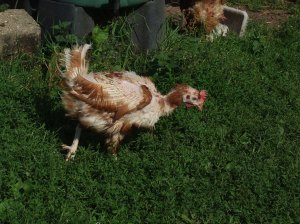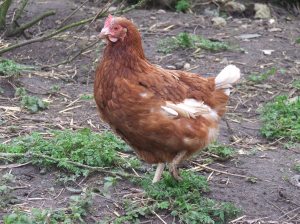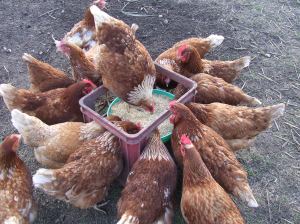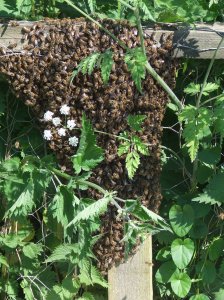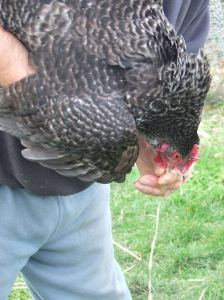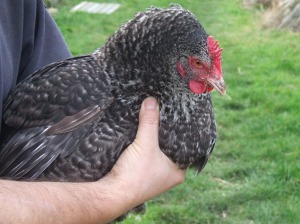Monthly Archives: February 2014
‘I’m not sure I like this new outfit!’
Finally, after 6 months, Nicky has gotten her feathers! It’s taken a while for her to get used to them; she preferred being naked, and pulled and tugged, causing blood to drip down her skin. Considering she has likely to have spent first first two years of her life naked, it is an understandable reaction.
Nicky joined my flock, her retirement home having been a egg-laying barn hen, last August. She was in a state, and never allowed at the feeder, having to fight for every mouthful. For the first couple of weeks, I fed her separately, and then, having gained some strength, she developed her own method and ran between the feeders, extending her telescopic neck and grabbing a morsel before running away.
Look carefully, and you can see her bare back-end at the top of the photo!
Inside a barn with thousands of other hens, all of which were bigger than her, her feathers were nothing more than a hindrance and provided the other hens with a means of holding her down. In order to escape the pecking, she would run. In the process, the feathers would be plucked free of her body.This would have happened over and over again. As a result, they stopped growing – a sensible solution.
It’s taken a while for her brain to realise she is in a new environment. She is a tough little bird. Even on the coldest, wettest of winter days, she would take a walk, unconcerned by the challenging weather reaching her skin. Feathers were for the weak! She did not like them, and even as they started to grow, plucked them free, leaving the downy feathers in piles under the bushes.
Did she like to be different? Did she not like her new outfit? Was it itchy? I really don’t know what her problem was, but regardless, she plucked them out causing blood to drip down her body. But they grew and grew. There was no getting away from the fact she was going through a change.
It has been a confusing time. She hides in the dense shrubbery, staying away from the others and puzzled by her pretty, feathery appearance. She won’t let us pick her up, something she has previously allowed. And what’s even more strange, at least to her, is that she has equal place at the feeder. For days, she would stand on the outskirts, waiting to be bullied. It never happened and it made no sense. Her world had changed.
Finally, Nicky is one of the flock. She is accepted. She is a proper little hen. Her next challenge is the rise through the rankings.
Honey is for the bees. Now we get our reward.
A couple of years ago this swarm arrived in my garden and since Doug and I both love nature, we decided to buy a hive and give them a home. We called a local beekeeper to collect the swarm and place the colony into a hive. It proved successful.
Our belief is to keep our interference to a minimum; it is a method known as ‘natural beekeeping.’ The bees do know what they are doing. They want to survive, and they have had years of experience! We should listen to them and give them only what they need. They don’t appreciate being interfered with, and they don’t like their winter storage of food stolen!
Honey bees are struggling in the UK due to a variety of reasons. For one thing, we use pesticide and fungicide sprays far too liberally. Given the amount of flying a bee undertakes it is easy to see that before too long the bee will fly into the deadly mist and inject the particles. If it doesn’t kill them, it will harm them. Some chemicals throw off the bee’s navigation system making foraging and returning to the hive difficult. A confused, dysfunctioning bee is not a productive bee.
The second problem I have considered has wider implications than we may first realise. It relates to the amount of honey we take from the hives during autumn.
The honey is there to provide the bees with food during winter. It is quite normal for beekeepers to take a proportion of the honey and replace it with sugar water. I do not believe this is logical, and certainly not when we take excessive amounts. Let’s think about this for a second. Honey is full of goodness. It is anti-bacterial and anti-fungal, it is a healing agent and a probiotic, and it has nutritional value, boosting our immune system. What does sugar water provide? Not a lot, aside from a little energy.
If we ate nothing but donuts, we would struggle to fight infection. It is the same for the bee. Spring is a time when bees need to be operating at their peak. They should be energised and ready to make new workers and drones, and potentially new queens; they should be gathering an abundance of pollen and nectar, and stocking up for later in the year when foraging becomes more difficult; they should be fighting fit.
Life is tough enough without our intervention. Bees are amazing little creatures, and it is an operation run by the girls. Let’s help them, not hinder them, and let’s not be greedy. They will pay us back many times over, not only with the pleasure we gain by watching them, but by producing healthy colonies and multiplying.
This time last year we had one hive, and now we have 3. Unfortunately, we did have 4 but one colony died last week. It is sad to see thousands of dead bees, but at least we had given them a chance. The queen was a virgin – in other words, not tried and tested – and so the chances of the colony surviving were slim. Figures crossed for the others.
Girl Power!
The magical stuff we take for granted
The stormy weather in the UK has persisted for the last few months, and many houses have been flooded for weeks. This has to be one of the most soul-destroying things that can happen, and I can only imagine the devastation one must feel. I am lucky. I live on the other side of the UK to where the worst of the weather had been occurring, but yesterday we had our first inconvenient experience.
The winds and rain had been building throughout the day, peaking in the middle of the afternoon. The noise was unsettling, and whilst you feel safe inside your house, you’re never quite sure of what was happening outside. Our main concern was for the beehives and the chickens.
We had weighted down the beehives with concrete blocks, so felt fairly certain they would be okay. The chickens, though, were another matter. Whilst we didn’t feel they could come to any harm, it didn’t stop us from worrying about them. Upon our inspection, they were undercover but sodden, since the wind was coming from the wrong direction. Our rooster, Stanley, was facing the corner of his shelter, and hunched up. Some of the girls were inside the house. Perhaps they were the ones with a fraction more intelligence.
So, we were all okay. But then the power went off. It made me realise how much we rely of the seemingly magical stuff that comes into our houses. Being without it was so inconvenient.
It was dark. I could not work on my computer. I could not have a warm meal or a hot drink. I could not listen to the radio. I could not read, except under torchlight, which I didn’t fancy. More importantly, I could not watch Andy Murray playing a tennis match on television! GUTTED!
So, we had cheese sandwich and a glass of cold water for dinner, and we sat by the wood-burning stove and did something often considered unusual in many households. We talked! Now there’s something new!
The break in power only lasted 5 hours, but it was long enough. It was made me realise how lucky we have been in recent weeks; parts of the UK have been having a hellish time, yet we have gone relatively unscathed.
If it weren’t for the swift response of the electrical company who battled the dark, the wind and rain to replace the snapped cable, I would still be eating cheese sandwiches and sipping cold water. Thank you guys!
Rhoda, the hen that needs a bra!
Meet Rhoda, a 3 year old Speckled Grey Hybrid laying hen.
She has a little problem. The upshot is, she needs a bra. Let me explain.
Ever few weeks during the last 2 years she has periods when she stops eating, and drinks ridiculous amounts of water. But the water does not go through her crop and it causes it to feel like a water-filled balloon. Basically, she has a propensity to sour crop, or at least something similar, and if we ignore the situation she will die a slow death.
Sour crop is a yeast infection in the birds crop, and aside from having a squishy crop, the bird has awful smelling breath.It will kill birds and it does need to be treated. Since Rhoda only has the squishy crop, and not the infection, she makes a swift recovery, so long as we follow our routine.
Our solution is to open her beak and tip her upside down. We follow this with a couple of crop massages during the course of the next few hours, and then another tipping if necessary. Since this problem occurs regularly, she has grown used to our intervention and is cooperative.
Today, as soon as I touched her, water spilled out of her beak, and that was when she was the right way up! Yet still she carries on drinking. Now I know why the phrase bird-brain!
The poor girl. As a result of this persistent problem she has rather a saggy crop. Even when it functions properly it hangs down to her legs, and, when she trots, swings from side to side. She needs a bra. Yes, they do exist. Crop Bra’s for Chicken’s! What next?
Would I be humanizing her too much if I put one on her birthday list?
Tip: Don’t leave dogs in the kitchen
Dogs provide us with many funny moments, and often it can be when they are at their most mischievous . . . or perhaps that’s just my quirky sense of humour.
I remember a time, many years ago, when I had 5 standard poodles. Yes 5 – 2 adults and 3 pups! When Doug and I left the house we believed the safest place for them was the kitchen, but they were an inquisitive bunch, and being a pack, encouraged each other to do their worst. One of them would seek out food left on the surfaces, whether it was food remaining in a pan or dish, or simply an unwashed plate. By using a paw, it would crash to the floor and they would lick the remains.
Lesson 1: never leave dishes, plates and pans on the kitchen surface. The smell of food, even when it’s just a smattering, is irresistible.
For a while, this mischievous pack of dogs was well behaved . . . until one of them learned to open the fridge. It was a disaster. Whilst we were out, they consumed a 2kg margarine tub, a large block of cheese, and many other goodies. It must have been quiet a sight seeing the raid, and probably very funny. However, cleaning up the mess they had left was not something I would describe as even vaguely amusing. Not only was everything greasy, but, well, let’s just say lots of fat equates to very slippery intestines! And there were five of them! Not fun!
As punishment, Doug sat them in a row and marched up and down voicing his disapproval. They looked so scared and squeezed their terrified bodies closer together. It seemed work, and weeks passed before we encountered any more trouble. Maybe the large magnet on the fridge door helped a little too!
Lesson 2: Put a big magnet or lock on the fridge.
Had they finally learned to behave, or more accurately, had we learned what to do to avoid any situations? It seemed possible. We persisted with the magnet and never left food, even just scraps within their reach. We were always vigilant, checking and double-checking everything on our departure. Nothing could go wrong; we had it covered. Even so, returning home always caused a feeling of dread.
I put the key in the door. It was quiet. Something was wrong. They should be barking and pounding the door with their paws. I knew then they had misbehaved and my stomach sank.
I opened the door. I saw. I screamed.
They had knocked over the deep fat fryer! Oil was everywhere, across the floor, over the kitchen units, and on the dogs. It was a disaster. We both flipped!
Lesson 3: Don’t leave the deep fat fryer near the edge of the surface.
With hindsight, it was very funny. I can still see their oily sorrowful faces, and I can see them trying to get away, unable to get purchase on the slippery floor. They looked so scared, fearing the big man who forced them into a line and marched up and down.
‘He loves us really,’ one said. ‘Not today,’ came the reply.
Lesson 4: Make sure you have a sense of humour at all times.
